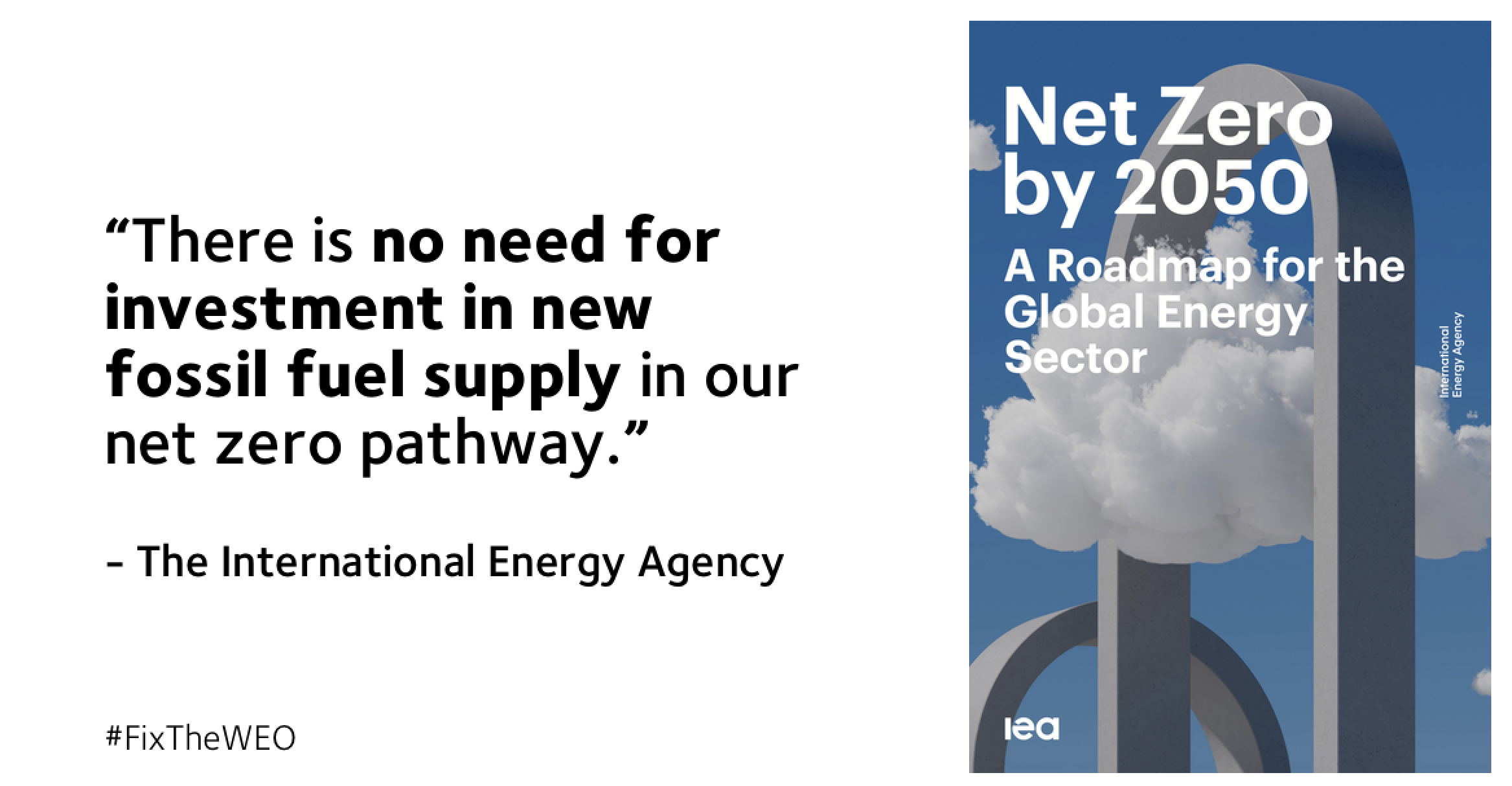For 50 years, while we’ve been fighting dirty fuels, corporations, financial institutions, and governments around the world have been using the projections of the International Energy Association (IEA) to justify the continuing expansion of unsustainable and damaging fossil fuel infrastructure and extraction. After being formed in 1974 to ensure the security of oil supplies, the IEA’s projections have historically fallen well short of what is needed to avert climate chaos. But in a jaw-dropping move, the IEA finally called for an immediate end to financing for new fossil fuel supply projects in order to slash net carbon emissions to zero by 2050. This news is, of course, a major milestone for climate justice and financial sustainability advocates. We’re in a time of a major wake-up call for the dying fossil fuel industry, but we not only need to stop financing for fossil fuels, we also need to end subsidies. This news, then, is also especially welcome in light of President's recent call to slash $121 billion in handouts to the fossil fuel industry from the federal budget.
The IEA report confirms that in order to limit global warming to 1.5°C (2.7 °F) and achieve net-zero emissions by 2050, “there is no need for investment in new fossil fuel supply.” It also demonstrates that in order to reach net-zero by midcentury or sooner—a goal shared by President Biden and many of the largest US financial institutions—financing of fossil fuel expansion must end immediately.
Released in March, the 12th edition of the most comprehensive report on fossil fuel bank financing, Banking on Climate Chaos, demonstrates that, even during a pandemic that resulted in an across-the-board reduction of fossil-fuel financing of nearly 10 percent, the world’s 60 largest banks nevertheless increased their financing in 2020 to the 100 companies most responsible for fossil fuel expansion by roughly the same percentage. Big banks have poured nearly $1.5 trillion into those companies over the past five years.
The IEA’s recent call removed one of the last common excuses to continue building business models around fossil fuel expansion, and, in the case of the United States’ biggest banks, pouring hundreds of billions into the industry. It likely comes as no surprise that United States banks snagged the top spots on the leaderboard for fossil fuel financing—a dubious distinction, at best—and continued to be the largest drivers of emissions in 2020. JPMorgan Chase, for example, has provided $317 billion in fossil fuel financing―33 percent more than any other private bank in the world. Interestingly, the IEA’s announcement came on the very same day as the bank’s annual shareholder meetings.
Also interestingly, these same banks have made some flashy “net-zero” announcements in recent months that might seem to promise big, bold climate action, but simply do not go far enough. For instance, earlier this month, JPMorgan Chase released 2030 interim emissions “intensity” targets for its financing of oil and gas, electric power, and auto manufacturing, following its October commitment to align its financing activities with the goals of the Paris Agreement. But setting this type of target, which measures greenhouse gas emissions per unit of production, fails to get to the heart of the matter, and actually positions the bank to get clout while their overall emissions continue on an upward trajectory―a textbook example of greenwashing.
With these announcements, the IEA pressured these financial institutions not only to recognize that the game is changing, but that they must be the ones to change the game. They can no longer rely on outdated models to defend the status quo and continue to invest in the dirty energy sources of the past. They can’t greenwash their way to a clean energy future, and they must take a hard look in the mirror to push themselves to do more to confront the climate crisis we face today.
This announcement spells it out loud and clear: There is substantial financial risk in the fossil fuel industry, and companies, financial institutions, and governments alike will be better off the sooner they—meaningfully and sincerely—commit to net-zero. A collective focus on a fossil-free future will mean more jobs, better access to energy, fewer communities and habitats disrupted or destroyed, and fewer premature pollution-linked deaths.
The stakes have been raised with this breakthrough scenario from the IEA, though there’s still room for improvement. The report overstates the roles carbon capture and storage, gas, and bioenergy should play in the transition to net-zero. All of these technologies are deployed by the fossil fuel industry, even though it is well known that they harm frontline communities, including the Indigenous communities who disproportionately bear the brunt of toxic pollution. The report fails to recognize and promote solar and wind energies as pivotal technologies to help transition to a clean energy future.
Still, the IEA report has sent the fossil fuel industry into a tailspin. While they are reeling, we will continue to stand together to keep up the pressure on the world’s biggest backers of fossil fuels to act on climate. Polls show that US voters overwhelmingly support the federal government taking strong action to curb the climate impact of Wall Street in order to prevent economic crises. We need to end fossil fuel financing, fossil fuel subsidies and keep risky fossil fuels in the ground. This IEA announcement sounds the alarm that governments must lead the way in this fight.
Take action: Tell the CEOs of the largest US banks to stop financing fossil fuels.
